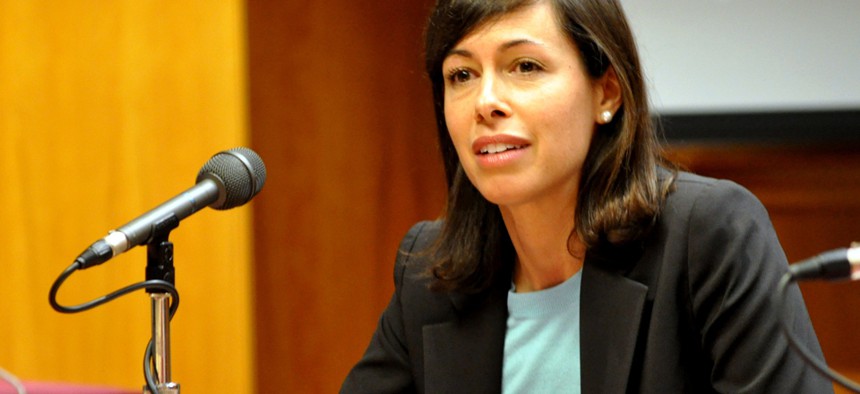Amid Protests, FCC Moves Ahead With New Rules for the Internet

"We cannot have a two-tiered Internet, with fast lanes that speed the traffic of the privileged and leave the rest of us lagging behind," Commissioner Jessica Rosenworcel said. Federal Communications Commission
The commission votes to advance new net-neutrality regulations.
The Federal Communications Commission is moving ahead with new regulations that would limit the ability of broadband-service providers to tamper with Internet traffic.
The net-neutrality proposal has sparked a massive public outcry because it could allow providers to charge websites for faster service in some cases. Dozens of protesters banged drums outside of the FCC's headquarters, and security guards led out five protesters who stood up throughout the meeting and began shouting at the five commissioners.
The Democratic members of the FCC overrode Republican opposition to advance the new regulations and begin accepting public comments. The agency will have to vote again in several months to finalize the regulations.
"It's not about whether the Internet must be open," FCC Chairman Tom Wheeler said, "but about how and when we will have rules in place to assure an open Internet."
But even the Democratic commissioners voiced serious misgivings about Wheeler's proposal.
"We cannot have a two-tiered Internet, with fast lanes that speed the traffic of the privileged and leave the rest of us lagging behind," Commissioner Jessica Rosenworcel, a Democrat, warned. She "concurred" with the proposal to move it forward but withheld her full support.
Rosenworcel said the agency should have delayed the vote in the face of the outpouring of public anger in recent weeks.
"I think we moved too fast to be fair," she said. "I think as public servants we have a duty to acknowledge and respond to the great tide of public commentary that followed in the wake of the chairman's proposal."
Commissioner Mignon Clyburn, also a Democrat, said she knew "something was just not right" when her mother called her to express concern about the issue.
But Clyburn noted that there are currently no rules on the books, and said Wheeler agreed to make last-minute changes to his proposal to address some of her concerns.
The FCC first enacted net-neutrality rules in 2010 that prohibited Internet service providers from blocking websites or "unreasonably" discriminating against any traffic. The goal of the rules was to ensure that no "gatekeeper" could distort the Internet in favor of certain companies or restrict speech online.
But Verizon sued, and a federal court struck down the rules earlier this year. The agency is now trying to rewrite the rules in a way that can survive future court challenges.
Wheeler blamed "those that sell Internet connections to consumers" for forcing the commission back to the drawing board.
"Today this agency moves to surmount that opposition and to stand up for consumers and an open Internet," he said.
His proposal would still bar Internet providers from blocking websites. The providers would also be banned from treating Internet traffic in any way that is not "commercially reasonable."
The commission has been vague about what exactly would be considered "commercially reasonable."
The proposal asks for comment on whether the FCC should have an assumption that any paid-prioritization deals are "commercially unreasonable" and illegal. And Wheeler emphasized that "nothing in this proposal by the way authorizes paid prioritization." But the tighter the FCC regulates so-called "fast lanes" for companies that pay, the harder time it will have defeating future lawsuits.
"The prospect of a gatekeeper choosing winners and losers on the Internet is unacceptable," Wheeler said.
Liberal advocacy groups have urged the FCC to reclassify broadband Internet as a "common carrier" utility under Title II of the Communications Act. The move would give the agency sweeping new regulatory powers, including the ability to enact stronger net-neutrality rules.
The proposal asks for comment on whether the FCC should use its Title II powers, but Wheeler has been reluctant to turn broadband providers into utilities. Republican lawmakers and the telecom industry would wage a political and legal war against reclassification.
The two Republican FCC commissioners voted against Wheeler's proposal, expressing skepticism that the FCC should regulate Internet access.
Republican Commissioner Ajit Pai argued that Congress—not the FCC—should decide net neutrality.
"Every American who cares about the future of the Internet should be wary about five unelected officials deciding its fate," Pai said.
Commissioner Michael O'Rielly, the other agency Republican, called the proposal a "boondoggle" and warned it could eventually lead to regulations of Google, Facebook, and other websites.






